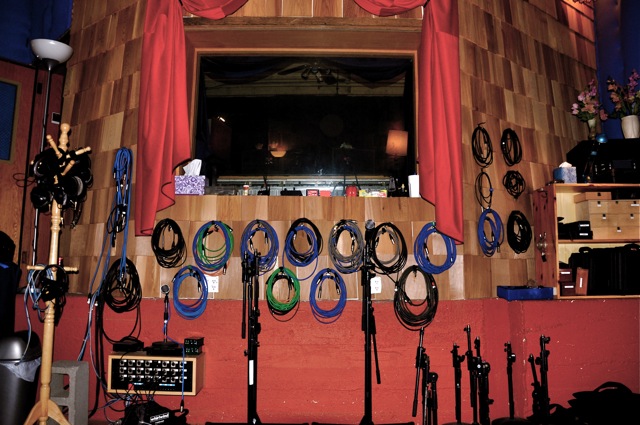MEDIA ROOTS– A couple of weeks ago, John Vanderslice killed his headlining show at the New Parish in Oakland. As he milled around the merch table enthusiastically greeting dedicated fans, I approached him and asked if he would be willing to conduct an exclusive interview for Media Roots. His response was unexpected- a charismatic and resounding “Yes” that rang with genuine interest.
Even more disarming than his excitement for the interview was his likability. Not only is John an amazingly talented songwriter, musician and producer, but he is also one of the nicest and most genuine people I have ever come across. More than anything though, he is an excellent storyteller.
 Throughout his impressive and lengthy discography, three albums
stand out as the most politically motivated: 2004’s Cellar Door is a
raw, activist rock album with brilliant underpinnings in its lyricism;
2005’s Pixel Revolt is a more refined, beautifully structured album full
of the same political angst; and 2007’s Emerald City, named after
Baghdad’s fortified “Green Zone,” is a rock solid gem, brilliantly
combining both the production quality of Pixel and the dark undertones
of Cellar Door.
Throughout his impressive and lengthy discography, three albums
stand out as the most politically motivated: 2004’s Cellar Door is a
raw, activist rock album with brilliant underpinnings in its lyricism;
2005’s Pixel Revolt is a more refined, beautifully structured album full
of the same political angst; and 2007’s Emerald City, named after
Baghdad’s fortified “Green Zone,” is a rock solid gem, brilliantly
combining both the production quality of Pixel and the dark undertones
of Cellar Door.
John’s songs are mostly narratives told through the eyes of different characters, giving him the ability to explore dark and controversial issues in a uniquely perceptive way. The political commentary throughout these albums range from 9/11 foreknowledge in the song Exodus Damage to the story of prostitution in Afghanistan in Trance Manual. The song White Dove explores humanity’s capacity to forgive horrific crimes of war, and Tablespoon of Codeine is about numbing your mind in order to cope with reality.
John Vanderslice’s sound can’t be boxed into any particular genre. It encompasses folk, rock, strings, electronic and experimental sounds. When his unique and amazing lyrics are added into the equation, his music transcends classification.
He runs the all-analog recording study Tiny Telephone in the Mission District of San Francisco, where bands like Deerhoof, Spoon and Death Cab for Cutie have recorded. I was lucky enough to sit down with John at Tiny Telephone for an in depth and candid conversation about the struggles of independent musicians, the US political system and foreign policy, and for some exclusive interpretive insights on a few of my favorite songs.
***
MR: What made you move to San Francisco from Gainesville, FL?
JV: I got an economics degree from the University of Maryland, because my dad really pressured me into getting a business degree. Economics was the most political subject, and I quickly realized it was used by people to enforce very self-serving legislation. Philosophically, you can bend numbers in whatever way you want to bend them.
In retrospect it was a very influential degree. To have a background in real stuff like the supply/ demand curve helped when I started the studio. It’s one thing to think about, but it’s another to stand face to face with it for your survival.
After graduating, I came out to visit my girlfriend who lived in LA. It was exciting in an end of the world, apocalypse now kind of way. There were crack wars and helicopters, and I was ready for it to all go down. You’re invincible at 21, you know? You’re just like bring it on.
One weekend I came to visit a friend in San Francisco, and I went crazy for it so I moved up. One day, I answered an ad for a space to rent- and it was this space, Tiny Telephone.

It was 1996 and it felt crazy. By 1997, we were a barely functional recording studio. Some days, it was a rehearsal space for bands and other days it was a recording studio. It was so low cost that we got away without having really any gear. Slowly the coalition broke up. I pitched to an engineer I knew who had just lost his studio about becoming partners. I told him that I would manage him and get him bands if he brought over all his equipment. That was 1998, and he still works here.
MR: Did you ever envision having a studio like Tiny Telephone?
JV: I remember listening to The Who records and looking at photos of recording studios in Queen albums as a kid and thinking that was what I wanted. But I never conceptualized it as a viable business plan. At the beginning, the nine of us sat down and ran the math of what would happen if we were booked out the studio a year in advance. We did the math: the division, the bills, the rent, and we were like this is not going to work.
But we said fuck it, let’s do it. For the first seven years, I was still a waiter. I’d never engineered a session, which allowed me to make my own records and plan my own tours. Otherwise, I don’t think it would have worked. It’s almost impossible for studios to make money for the first seven years, even if they’re busy.
MR: I’ve taken a lot of financial risks with what I do, because I have decided to remain completely independent and grassroots. I can only imagine that as an independent artist who has never signed on to like a multinational corporate label, you’ve taken a lot of financial risks as well.

There will always be a future for something that’s unique though. We always had tape decks and have provided free tape for every band we record. It has been done like that for a long time, and with great results.
You also can’t compete with everyone . If we decided to open a store tomorrow, it couldn’t just be a cupcake store. It would have to be something 100x more extreme, like a store that serves cardamom in everything. Having a micro market is the only way to do it now- you have to serve a niche and fly a flag. You have to be 100% dedicated to what you’re doing.
MR: Has your dedication to serving this old school analogue niche also kept you true to staying independent and in pursuit of your vision?
JV: For me, the music and the studio are one and the same. It’s been helpful that I’ve had this space to do records, because it’s shielded me from having to make any weird deals that didn’t feel right.
MR: Does working independently from a corporate music model give you the freedom to push your limitations as an artist?
JV: Definitely. The next album will be with Magik*Magik Orchestra, and I want it to be a much more conceptual, weird and immersive experience. I’m thinking about incorporating a boy’s choir into the record, and do things that are more committed to Magik’s world. Thankfully, I don’t have the pressure of being on a label or hooked up with managers that are not willing to go down those experimental avenues.
MR: Even though Media Roots isn’t primarily music based, I wanted to interview you because your music touches upon a lot of deep political issues that aren’t usually expressed in music. Have you always been politically aware?
JV: I grew up in the suburbs of DC and saw firsthand how much manipulation there is. My mom is a crazy left wing tree shaker, and my dad is very right wing. So I grew up in a very politically divisive household. All our friends either worked for the EPA or they worked to undermine environmental laws. Those were the kind of people that were around.
We knew it mattered what people did, and we knew it mattered where they put their time and money. I grew up during the horrible Reagan era of de-regulation. There was also a general hostility towards the federal government. There wasn’t a grown-up discussion about how we are going to optimize our tax money and create a social safety net. Yet now we see Reagan being herald as some hero…
He is being held up as this icon- but it’s all propaganda. He was never a true conservative. It’s a fairytale and it’s all fucking storytelling. Although I have always been politically interested, there are definitely times that I’ve had to stop caring because it gets too frustrating. The Obama thing is a real shocker too. Right when you think you finally got a break, it’s like wow is this it? I don’t remember Clinton being this disappointing. This is just a new level of disappointment.
MR: Yeah, I wasn’t expecting much but I definitely was expecting more than what he has done. Then when you look at the amount of money being funneled into the elections, it’s like where the fuck is our nation’s priorities here?
MR: Let’s talk about the song Exodus Damage. The video is an amazing visual representation for that song. Is that your photography?
JV: It is my photography and Brent Chesanek did the video, he’s awesome. The initial idea for the song came from my interest in Timothy McVeigh and homegrown terrorism. I got intrigued by some of the hangers on around him that weren’t willing to commit to his idea of revolution and extreme violence. One of his co-conspirators actually expressed regret at the trial for not being able to commit 100%, and I found that fascinating. Like the point where you’re talking with some guy who is saying he’s going to bring the fertilizer pump in, and you either you hang up the phone or you don’t. Exodus Damage is about the regret of not being able to commit 100% to a cause, whatever that cause may be.
If you’re politically committed, for example if you’re fighting in a rebel group in Libya right now, everyday you have to re-define what you’re doing in order to guard yourself against doubt. Nietzsche’s concept “The Genealogy of Morality” talks about how in the absence of any strong belief system humans will randomly find something else to believe in, because that’s the predicament of being human. The human capacity for extremism and our potential for insanity is what’s endearing to me.

JV: I have a desire to hear extreme language and weird shit being said. I always want to be surprised, but of course I also have to process. I just heard a writer talking about how his writing isn’t actually dealing head on with his own problems but instead it’s a sideways filtering out of this internal horror that if he were to directly deal with it directly he would incinerate. I think that’s a great way to put it.
MR: In Exodus Damage, the
phrase that stuck out to me was “Dance, Dance Revolution.” It’s
such a powerful phrase because it can be interpreted in so many ways.
Why did you write that?
JV: When I went to Japan, there were millions of iterations of the Dance, Dance Revolution video game everywhere, they are on a totally different level of gaming than in the States. I just thought how often the word revolution is used when they really don’t mean it. There’s Revolution Cafe, there’s Dance, Dance Revolution and I thought is that all we are going to get? Just echoes of echoes of revolution.
MR: I also wanted you to talk about Heated Pool and Bar. The song covers a lot of ground, from the Colombian drug cartels to the poppy fields of Afghanistan. What was the inspiration for that song?
JV: Sometimes I like having songs that try to justify extreme military action. In Heated Pool and Bar, the narrator is justifying this tentacle like approach to foreign policy, where we have to be ruthlessly involved in all these areas. That language might be a harsh way to look at the world, but every problem is solved now by hard military action and no real diplomacy.
We get involved with these countries so easily, but it’s very difficult to pull out. I don’t even know how many thousands of bases we have worldwide, but it’s insane. It’s triptych- drugs are a very valuable resource and another big reason why we are engaged in certain countries. If we aren’t controlling something, it means somebody else is. If the US didn’t hold territory in Afghanistan, then the Taliban would be incredibly well funded, making hundreds of millions of dollars selling unrefined opium. That drug money filters through our military for bribes and other crooked shit, but that’s all part of the game.
Part of Vietnam was about heroin too. Drugs are an essential part of American foreign policy and you don’t even have to say that we’re selling the drugs. It’s about the control of the resources. If we were just assholes, we’d say of course we should invade Iraq. Fuck, might as well invade Arabia.
MR: Just be fucking real about it.
JV: Exactly. Don’t give me this democracy bullshit. During the first interim Iraqi elections, so many people were illiterate that they were putting symbols for people running for office, like a chicken would be someone running for school board. I mean c’mon these aren’t elections. And we are paying for all of it. Let’s just say that we didn’t care if all Muslim people died. If you’re being honest about it that’s fine, but the sheer amount of money that’s being spent to control these resources isn’t worth it.
MR: It’s definitely not sustainable to build an empire on debt.
JV: Every empire has lost by overextension. It’s unavoidable.

JV: That’s part of the Heartland Theory, where you take Iraq because of its location on a map. You look at the bordering countries, the stability of the region, and where the resources flow throughout. If you were playing a game of risk, you would have to take Iraq. It’s a smart place to camp out. If the presidential debates went like that, I wouldn’t have a problem with it. Then you could really weigh the cost of civilian life and of running up these massive military deficits. But it’s sold as something else.
I think part of it is also having a very small percentage of a population that drive everything. 10-15% of the American population are evangelical voters, but they are way more powerful than their numbers. Small coalitions like that can wield tremendous power, and then you can have broad loose coalitions hat have zero power. A lot of people in my life don’t vote, because they are so done. There are 30 or 40 industrialists that drive the public conversation. The chairman of Fox News, Roger Ailes, feeds stories that drive Rush and Beck. It’s about keeping the chatter going back and forth.
MR: Seriously, why are we talking about abortion rights and gay marriage in 2011? How did we de-evolve to this point in the public discourse?
JV: It’s a brilliant tactic that I think comes from the top echelon of people who are amoral and transcendent on these issues. I don’t think Dick Cheney gives a shit about gay marriage. These people are top level thinkers, they are working on maps of the world for resource allocation and at maps of the electoral college to strategize votes in this country. I can tell you right now that Obama is going to win the next election. It’s pointless to vote for president, especially in CA because of the electoral system.
MR: It almost seems like it’s by design, so that people will dis-engage politically.
MR: One song that really resonated the most with me is Tablespoon of Codeine. This song is amazing on so many different levels, because you can go the way of the pharmaceutical industry dumbing ourselves down and that we don’t face reality…
JV: Part of it was going down the rabbit hole of 9/11. With one attack, there was the biggest shift in foreign policy that’s happened in 100 years. Pre-emptive war was back on the table. Looking back pre-Afghanistan and Iraq, one of the most insane things for me was the Project for a New American Century (PNAC), a group that had drawn out plans to go into the Middle East to control the resources. The plans were on the table for decades, and it was the same players involved: Wolfowitz, Cheney, Rumsfeld. It’s almost too easy, it’s like a satire of a conspiracy.
When Reagan invaded Granada with 400 troops, it was a stunner because it was the first time we had stepped on foreign soil since Vietnam. There was a lot of internal debate about it there was in this country. Where we went 20 years from that point is crackers. There were no military contractors until 10 years ago. They were janitors and now they are half our force. Also, they operate in some kind of legal limbo that serves all kinds of war crimes.
When I thought about all of this, extraordinary rendition and ghost planes, I went nuts. I have a prescription for codeine cough syrup, and I actually found myself drinking it to turn off my mind to go sleep. It was really unsettling that I drugged myself to stop being depressed about this country.
I really do love this country and I think it’s an incredible experiment. You want to believe in where you live and where you pay taxes. When you are in the voting booth you don’t want to think that it’s completely manipulated and evil.
There is also an enormous amount of poverty in this country. Every time we go on tour, the country seems more and more busted. There are more trailer parks and abandoned cities. Katrina was a big deal, but there are mini versions of Katrina everywhere. It’s shocking that America is the richest country but the poverty keeps getting worse year after year. Six months later I will be driving through Alabama and it’s like what the fuck happened? Did Katrina hit here?

JV: Well it can’t be good, right? The debate is so retrograde and infantile, the only way it can work out is if we have a information based society. We should pedaling information as a progressive western democracy, but instead we’re behaving like China.
We’re having these debates that wouldn’t fly for two seconds in European nations’ political discourse. You’d like to think that there is some kind of progress being made with basic human rights.
MR: I have read a lot of your opinion on print and the digital age. Print is obviously dead as everything goes into digital. We just sat down with Chris Hedges who gave the perspective that because print is dying, there will be no more real journalism being done online. He says we are “awash in electronic hallucinations” and that this superficial saturation has damaged the debate and diluted intelligent discourse.
JV: In theory, having a free flow of information and access to raw Wikileaks documents and government legislation should be really useful. Anyone can go online and download a massive PDF of these bills and read what is going on. The access to this information should elevate the national debate, but instead I think the national debate is at its lowest point ever.
I thought there would be more cynicism. If the DNC makes a statement, I’m like bullshit. And the same with the RNC. I assume everything they say isn’t true. The human condition should be extreme cynicism against every claim made from any authority. Everything should be up for debate. Instead, there is an enormous amount of cheerleading that’s happening. The whole tea party movement is really shocking too, it seemed to come out of nowhere.
MR: I think it was just the neo-conservative hijacking of the libertarian spirit and Ron Paul movement that had been generating for years.
JV: Ron Paul is fascinating. I have no problem with libertarianism. If we’re in a room with an evangelical Christian, a knee jerk Democrat and a libertarian, you’re probably going to agree with and be more charmed by the libertarian as long as he’s not in the extreme line of Cato Institute economic thought about corporations having individual rights.
Ron Paul is by far the most critical politician. His beliefs are exciting, like abolishing the Federal Reserve. Why not? Let’s try it and see what happens. At least the power structure will be inverted somewhat. It’s anti-religion and absolutely anti-imperial which I’m great with.
But when you see who is speaking at tea party rallies, there has to be only 2% of true libertarians in audience, otherwise they would be booing Sarah Palin and Nick Roman.

JV: Yeah. He ran on a lot of stuff: healthcare, ending Don’t Ask Don’t Tell. I thought that within the first two weeks there would be these incredibly strong proclamations and executive orders done. I thought that we would be out of Iraq within three or four years, which was probably naïve. I never thought that Afghanistan would get ramped up, which goes to show you what desperation will lead you to when there is an absence of hope. I wasn’t unrealistically excited, but I thought it had to be better. But he’s arguably worse on civil liberties than Bush was which is really scary.
MR: He’s seeking out a three-year extension on the Patriot Act.
JV: That should have been the first thing that was repealed.
MR: And Bradley Manning sits in a cell and is being forced to strip naked every night. They are probably psychologically breaking him down to coerce a false confession, because if they had any evidence that he released the documents than why haven’t they shown us? Proof of his culpability might justify his treatment in the eyes of a lot of people.
JV: We’ve tortured a lot of people that aren’t guilty. In Guantanamo, there’s tons of people that were just picked or sold by clients. They have no actionable intelligence whatsoever, but we’re torturing them just so we can learn how to torture better.
MR: It’s insane because I thought we realized that torture doesn’t work and has never provided reliable intelligence. So what’s coming up next for you John?
JV: We are going to play White Wilderness in its entirety with Magik*Magik Orcherstra at the Herbst Theatre on June 17. It is going to be the only time that White Wilderness has played with an orchestra, and it’s going to be really fun. The official opening for the new extension to Tiny Telephone, the non-profit studio is May 1st. It’s going to be $200 a day to record, and Magik*Magik Orchestra will be involved in the process.
***
Buy tickets for John Vanderslice’s show with Magik*Magik Orcherstra on June 17th here. To find out more about John Vanderslice go to www.JohnVanderslice.com and to check out Tiny Telephone go to www.TinyTelephone.com
Writing by Abby Martin. All photography by Abby Martin of Tiny Telephone studio. To read more of Abby’s writing go here.










